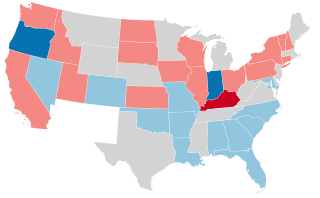
The 1908–09 United States Senate elections were held on various dates in various states. As these U.S. Senate elections were prior to the ratification of the Seventeenth Amendment in 1913, senators were primarily chosen by state legislatures. Senators were elected over a wide range of time throughout 1906 and 1907, and a seat may have been filled months late or remained vacant due to legislative deadlock. However, some states had already begun direct elections during this time. Oregon pioneered direct election and experimented with different measures over several years until it succeeded in 1907. Soon after, Nebraska followed suit and laid the foundation for other states to adopt measures reflecting the people's will. By 1912, as many as 29 states elected senators either as nominees of their party's primary or in conjunction with a general election.

The 1900–01 United States Senate elections were held on various dates in various states, coinciding with President William McKinley's re-election as well as the 1900 House of Representatives elections. As these U.S. Senate elections were prior to the ratification of the Seventeenth Amendment in 1913, senators were chosen by state legislatures. Senators were elected over a wide range of time throughout 1900 and 1901, and a seat may have been filled months late or remained vacant due to legislative deadlock. In these elections, terms were up for the senators in Class 2.

The 1840–41 United States Senate elections were held on various dates in various states. As these U.S. Senate elections were prior to the ratification of the Seventeenth Amendment in 1913, senators were chosen by state legislatures. Senators were elected over a wide range of time throughout 1840 and 1841, and a seat may have been filled months late or remained vacant due to legislative deadlock. In these elections, terms were up for the senators in Class 2.

The 1793 United States Senate special election in Pennsylvania was held on February 28, 1793. Albert Gallatin was elected by the Pennsylvania General Assembly to the United States Senate.

The 1794 United States Senate special election in Pennsylvania was held on March 31, 1794. James Ross was elected by the Pennsylvania General Assembly to the United States Senate.

The 1797 United States Senate election in Pennsylvania was held on February 16, 1797. Incumbent James Ross was re-elected by the Pennsylvania General Assembly to the United States Senate.

The 1808 United States Senate election in Pennsylvania was held on December 13, 1808. Michael Leib was elected by the Pennsylvania General Assembly to the United States Senate.

The 1814 United States Senate election in Pennsylvania was held on December 10, 1814. Incumbent Jonathan Roberts was elected by the Pennsylvania General Assembly to the United States Senate.

The 1831 United States Senate special election in Pennsylvania was held on December 13, 1831. George M. Dallas was elected by the Pennsylvania General Assembly to the United States Senate.

The 1840 United States Senate election in Pennsylvania was held on January 14, 1840, after the regularly scheduled election in December 1838 was postponed due to the Buckshot War. Daniel Sturgeon was elected by the Pennsylvania General Assembly to the United States Senate.

The 1845 United States Senate election in Pennsylvania was held on January 14, 1845. Incumbent Daniel Sturgeon was re-elected by the Pennsylvania General Assembly to the United States Senate.

The 1861 United States Senate special election in Pennsylvania was held on March 14, 1861. David Wilmot was elected by the Pennsylvania General Assembly to the United States Senate.

The 1901 United States Senate special election in Pennsylvania was held on January 15, 1901, after the regularly scheduled legislative election in January—April 1899 failed to elect a Senator. Former Senator Matthew Quay, who had left the Senate for nearly two years because of the political stalemate, was again elected by the Pennsylvania General Assembly to the United States Senate.

The 1909 United States Senate special election in Pennsylvania was held on March 16, 1909. George T. Oliver was elected by the Pennsylvania General Assembly to the United States Senate.

The 1801 United States Senate special election in Pennsylvania was held on December 17, 1801. George Logan was elected by the Pennsylvania General Assembly to the United States Senate.

The 1834 United States Senate special election in Pennsylvania was held on December 6, 1834. Future President of the United States James Buchanan was elected by the Pennsylvania General Assembly to the United States Senate.

The 1836 United States Senate election in Pennsylvania was held on December 14, 1836. Future President of the United States James Buchanan was re-elected by the Pennsylvania General Assembly to the United States Senate.

The 1845 United States Senate special election in Pennsylvania was held on March 13, 1845. Simon Cameron was elected by the Pennsylvania General Assembly to the United States Senate.

The 1877 United States Senate special election in Pennsylvania was held on March 20, 1877. J. Donald Cameron was elected by the Pennsylvania General Assembly to the United States Senate.

The 1879 United States Senate election in Pennsylvania was held on January 20, 1879. J. Donald Cameron was re-elected by the Pennsylvania General Assembly to the United States Senate.




